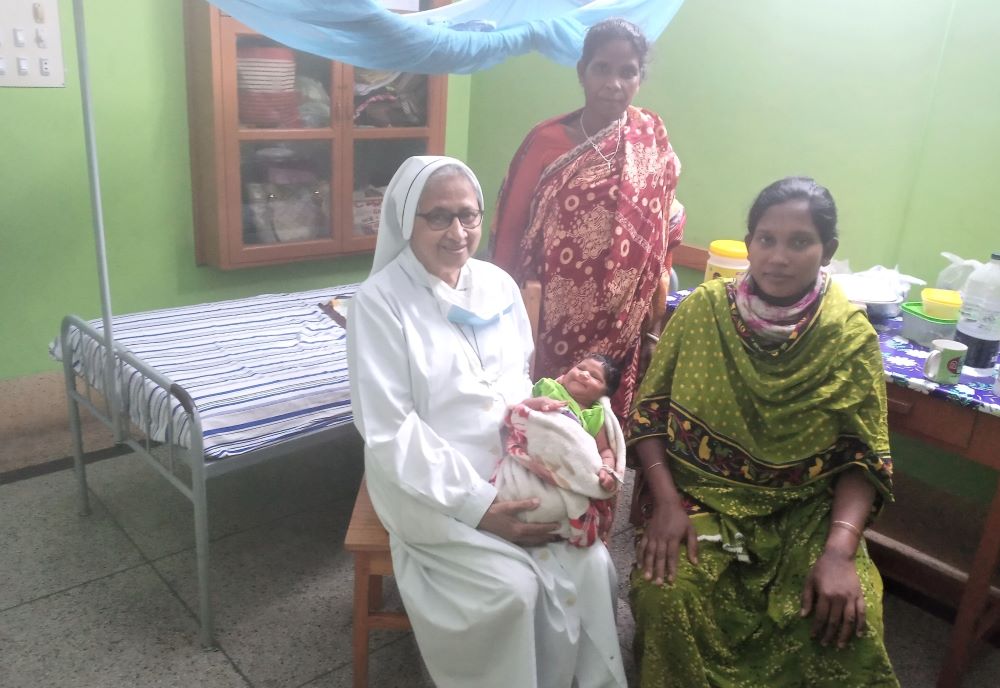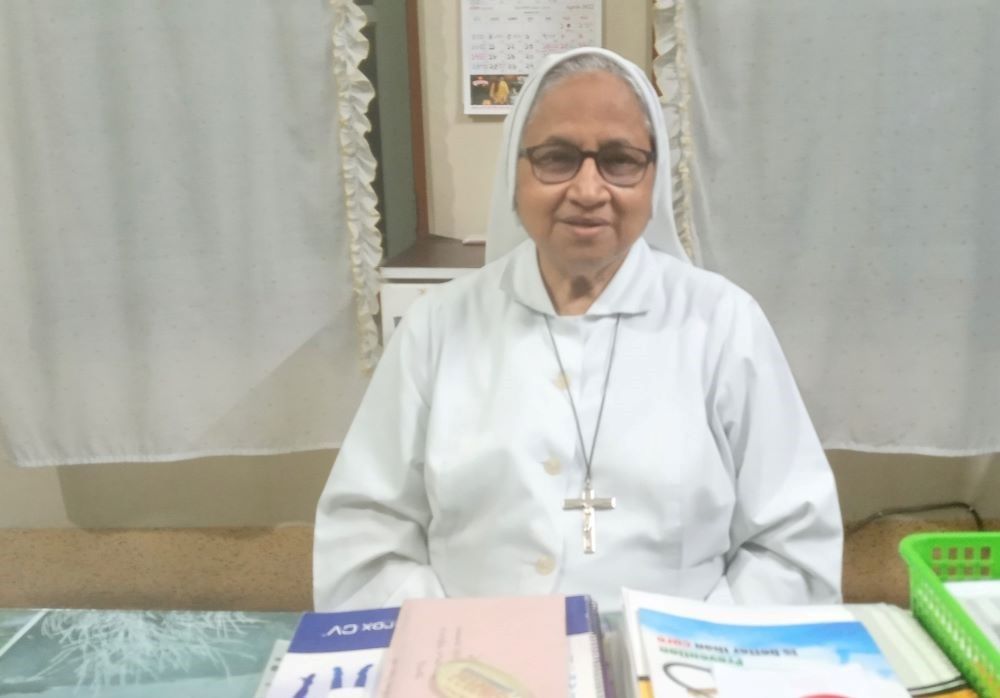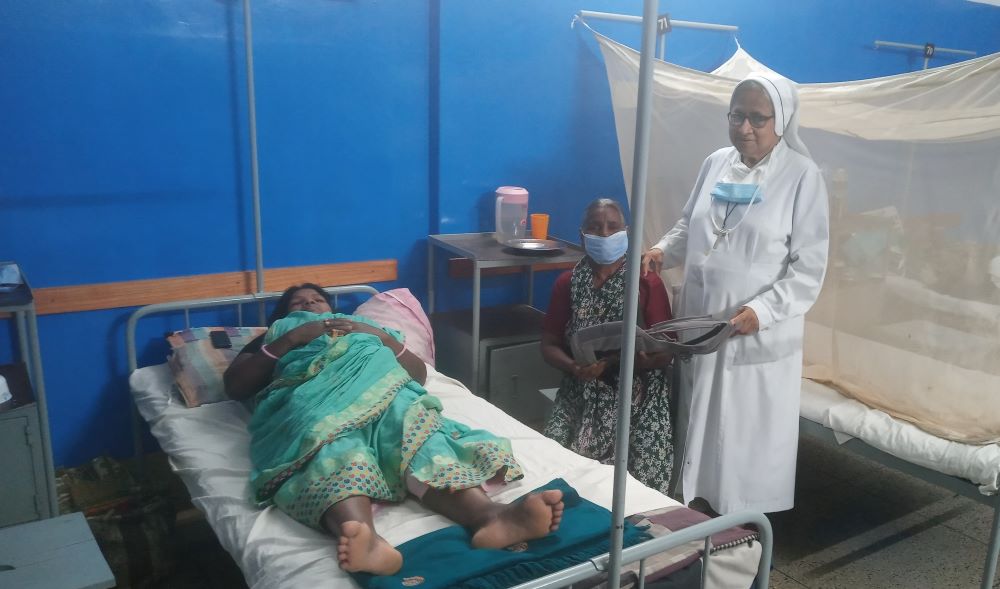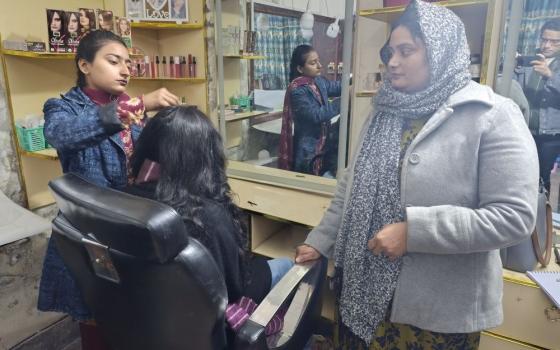
Sr. Sandra Joseph, a member of Sisters of Charity of Sts. Bartolomea Capitanio and Vincenza Gerosa, visits a newborn baby and their relatives at St. Vincent Hospital in Dinajpur, Bangladesh, where she has ministered for 42 years. (Sumon Corraya)
Sr. Sandra Joseph, a member of Sisters of Charity of Sts. Bartolomea Capitanio and Vincenza Gerosa, has been serving in Bangladesh for 42 years. She has helped couples who have had trouble conceiving, leading to more than 500 births. Joseph, 74, works as a nurse at St. Vincent Hospital in Dinajpur, Northern Bangladesh. People not only from Dinajpur District, but the surrounding area, go to her for advice and treatment.
According to research, one out of every six couples faces infertility in Bangladesh. Women especially encounter many challenges in family and society. Because of this, many couples divorce and men remarry, blaming their wives for the infertility. Joseph, a missionary sister born in India's Kerala state, helps couples with this issue with her low-cost treatment.
After completing a three-year nursing course from St. Louis Hospital in Kerala, Joseph started following her interest in obstetrics, reading many books and researching to find a solution to infertility. According to the World Health Organization's health worker density in South Asia data, in 2020, there were six doctors for every 10,000 patients in Bangladesh. Most low-income people can't afford to see specialist doctors due to medical fees.
Joseph talks with patients, does counseling, and advises them on medical tests. After showing a couple's test reports, a doctor prescribes medicine. As a nurse, she cannot write prescriptions. She spoke to GSR about her service to couples facing infertility.

Sr. Sandra Joseph sits in her office at St. Vincent Hospital in Dinajpur, Northern Bangladesh, where she works as a nurse. (Sumon Corraya)
GSR: You have been working in Bangladesh for many years in a different culture. As a missionary how have you enjoyed your days?
Joseph: In my childhood, I had a desire to be a missionary nun. I walked 5 kilometers (3 miles) to reach our school. I observed nuns' life at our school. Their holy lifestyle attracted me. After completing my school education, I expressed my desire to my parents. They gave me permission, and I entered into religious life. I became a nun on Oct. 2, 1970. I served in my own country for 10 years, and my congregation sent me to Bangladesh on May 25, 1981, as a missionary. I thank God that my dream was fulfilled. I enjoy a lot in this country as a missionary. For 15 years, I served at Fatima Hospital in Jessore and for the last 26 years, I have been serving St. Vincent Hospital in Dinajpur. My pastoral work is with all faith people. I am impressed by the sincerity and hospitality of this country's people.
How do you help infertile couples?
Being it is a Muslim-majority country, most of our patients are non-Christians. Patients and attendants can easily reach me and share their words. From the beginning, I discovered that many couples came to the hospital with childless problems in their married life. I started to work on this issue. I listen to their words. Later, I started research on obstetrics. First, merely women came with their problems. I told them to come with their husbands. The second time, they both come. I listen to their words carefully and tell them it might be a problem with them both. Husband and wife both do medical tests as per doctors' prescriptions and my counseling. We diagnose problems for childlessness. Later, we prescribe medicines and they get outcomes. The process is simple, but we invent many barriers behind this process. Male-dominated society seems to think childlessness problems is only female.
What kinds of problems do you get among infertile couples?
Sometimes, we find problems between husband and wife, or only husband or only wife among infertile couples. Usual causes of infertility are late marriage, general hygienic condition, improper medication, random use of oral contraceptives for a long time. Additionally, infertile causes for women are problems in the uterus, and menstrual regulation, etc. Men suffer from a lack of semen.
Please share a story about an infertile couple.
You know that infertility is a problem that affects both husband and wife. It is a problem that reaches deep into their emotional life. Each day, many couples come to me with their problems. Among them, Momotas Khaton and her husband came to me. Khaton was six months pregnant. They arrived from Thakurgaon District, 57 kilometers away. Before, Khaton had lost seven children. She met with me and shared her story with tears. She became very emotional and appealed to me saying, "Sister, we heard from a neighbor that your hand has magic. If you do treatment, mothers can save their babies. Please help us by saving our child." She stayed in the hospital for maternity treatment. I encouraged her and told her I was with her. She was blessed with a girl child. However, for a Muslim woman like Khaton, it is a miracle for her life and it happened for me. I encouraged her to pray to Mother Mary for the child and that woman did it. Later, Khaton named her daughter Mary Khaton as she was gifted her daughter by praying to her. I still have communication with Khaton. They are very thankful to me.

Sr. Sandra Joseph, a nurse who works with couples who have had trouble conceiving, visits a pregnant woman at St. Vincent Hospital in Dinajpur, Bangladesh. (Sumon Corraya)
Please tell me about the service of this hospital.
The name of the hospital is St. Vincent Hospital in Dinajpur. It is run by Pime Missionary priests. We nuns support them. It is a general hospital with 60 beds. People get treatment with minimum cost. A total of 17 doctors work here. There is a nursing institute, too; once I taught there. This hospital has insurance for Christian patients. If anybody deposits 500 BDT ($4.60), they get up to 18,000 BDT ($166) for medical and treatment support from this hospital. It is very useful for the Christian patients because most people in this country are not aware of general medical insurance.
Do you face any challenges or barriers as a Catholic nun in your ministry?
I didn't face any big challenges or barriers in my missionary life. I do collaborate with people and they return to me love and respect. Some small challenges I do face, but with the blessings of Jesus Christ, I overcome these.
Advertisement
Please share your prayer life.
My first identity is, I am a nun, then I am a nurse. I keep time to adore Jesus Christ as he is my Lord. Adoring him, I get peace inside of my heart. Besides, I also pray through St. Joseph, father of Jesus Christ. I pray for childless parents because I know how much pain they have for problems with infertility.
Do you want to say anything else?
I have four sisters and two brothers. My younger sister, Pauline Joseph, became a nun. She is a member of Missionaries of Charity (Mother Teresa's Sisters). After three years in Bangladesh, I went to India to meet with my brothers and sisters. My two brothers and two sisters are alive, the rest died due to elderly age and various sicknesses. But living in Bangladesh for a long time, I'm very fond of this country. In our congregation, at present, we have a total of 105 nuns in this country, including five Indian nuns. We are serving six dioceses out of eight dioceses in health, education and orphanage ministry. Religious vocation is declining. Merely two novices and now postulates are in our formation houses. We need to pray for women religious.







